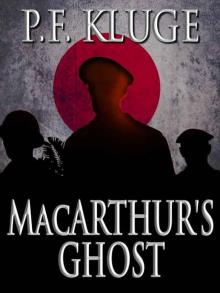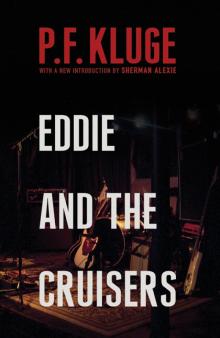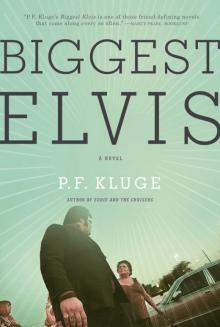- Home
- P. F. Kluge
MacArthur's Ghost
MacArthur's Ghost Read online
MACARTHUR’S GHOST
By P.F. Kluge
Digital Edition published by Crossroad Press
Copyright 2013 / P.F. Kluge
Partial cover image courtesy of: On.p.yee
LICENSE NOTES
This eBook is licensed for your personal enjoyment only. This eBook may not be re-sold or given away to other people. If you would like to share this book with another person, please purchase an additional copy for each person you share it with. If you’re reading this book and did not purchase it, or it was not purchased for your use only, then you should return to the vendor of your choice and purchase your own copy. Thank you for respecting the hard work of this author.
Meet the Author
Novelist, journalist and teacher, P.F. Kluge is Writer in Residence at Kenyon College. His six previous novels include Eddie and the Cruisers and Biggest Elvis. His non-fiction books include The Edge of Paradise: America in Micronesia and Alma Mater, an account of a year in the life of Kenyon College. Two films, Dog Day Afternoon and Eddie and the Cruisers, have been based on his work. His journalism appears in National Geographic Traveler, where he is a contributing editor, and elsewhere. A native of Berkeley Heights, New Jersey, Kluge lives in Gambier, Ohio with his wife, Pamela Hollie.
DISCOVER CROSSROAD PRESS
Visit our online store.
Subscribe to our Newsletter.
Visit our DIGITAL and AUDIO book blogs for updates and news.
Connect with us on Facebook.
Join our group at Goodreads.
CONTENTS
MACARTHUR’S GHOST
A Preview of ALMA MATER
A Preview of FINAL EXAM
To Michael Carlisle, in thanks for years of friendship and good counsel...
MACARTHUR’S GHOST
Part One
DECEMBER 1981:
FORTY YEARS AFTER
CHAPTER 1
At dawn, I discovered Manila. I learned that Manila air was fog and sweat and steam, that it smelled of garbage fires and cooking and diesel fumes and, just possibly, the sea. I reconnoitered the world-class monoliths the Marcos government erected on landfill at the edge of the sea, expositions, exhibitions, theaters, convention centers, concert halls, hotels, all protected by sleepy security guards cradling rifles the way a kid holds a teddy bear. I nodded to what looked like a permanent encampment of taxi drivers in the parking lot of my 90 percent empty hotel. They cooked and spat, played chess, gossiped. They slept inside their cars. They hardly ever moved, a cargo cult waiting for planeloads of moneyed tourists to turn their hemorrhaging economy around. I trotted along Roxas Boulevard and saw squatters sleeping among palm trees, washing themselves in public fountains, like starlings splashing in birdbaths. I caught the eye of a woman who stood holding her baby up and out, as if to ceremonially welcome the sunrise, till I noticed the baby was peeing into the morning tide. The woman turned and held the kid toward me, the catch of the day. I ran on. I was pursued. “Hey, Joe, give me a peso,” cried the squatter boy who dogged my footsteps. I increased my pace and so treated the early morning traffic on Roxas Boulevard to a duel between an adult American in $50 running shoes and a barefoot beggar urchin, all sores and scars. I couldn’t lose him. We raced past the U.S. embassy, through the morning crowd of visa applicants that clogged the sidewalk, past the marine guards. I turned, heading back to the hotel, and this maneuver surprised the kid. He stepped aside. Perhaps he feared a beating. But as soon as I passed him, the race was on again. “Hey, Joe. Hey, Joe.” I couldn’t lose him: he was a bad dream, guilty conscience, hangover. And he was loving it. So did everyone who was trapped in morning gridlock. They beeped their horns, they whistled, they laughed: office workers, taxi drivers, stevedores, and a whole busload of uniformed Lolitas headed to convent school. “Hey, Joe, very hungry. Hey, Joe, give me a peso.” They picked up the chant. A corridor of sound, a gamut. At last I reached the hotel. Sanctuary. Rattan furniture, marble floors. Advertisements for tours and folklore shows. Air conditioning. Baby Maria and the Soul Titans nightly in the Tropical Shack. I stood inside, gasping, looking out. He was a cocky, scrappy, guttersnipe kid, the kind who tagged along with G.I.’s in the old war movies and wound up showing them the back entrance to enemy headquarters. He stood out there, hands on his hips, staring right back in at me. Not begging, just staring. One of the hotel doormen, dressed as a Spanish conquistador or something, watched him closely. I gestured for the kid to stay, went up to my room for my wallet. By the time I got back downstairs, he was gone.
CHAPTER 2
“Hey, George,” Clifford Lerner shouted. “You still in the business?”
They had been drinking for a while when Griffin found them in a cocktail lounge just off the Manila Hotel’s main lobby, a party of friends, colleagues, competitors, fellow sufferers and sinners convening to celebrate the fortieth anniversary of World War II and feeling no pain. Just sitting around the Manila Hotel, it was hard not to believe that your life had worked out very well, landing you in a place of white marble floors, dark wood, high ceilings, a place of tropical plants and comfortable chairs, service with a smile, and the buoyant faith that with money all things were possible.
“Of course I’m still in the business,” Griffin replied. He shook hands with Lerner, a sharp-tongued hack who ran half a dozen strings for magazines in Canada, New Zealand, and his native Australia.
“I heard you were running out of gas,” Lerner said.
“That’s what I heard too,” Hugh Elliot said. “Had any fun here yet?”
“I got chased by a beggar when I went jogging this morning,” Griffin volunteered. “He stayed with me all the way back to the hotel.”
“You should see what chased me last night,” Lerner said. “Caught up with me, too.”
“Was she good?” Hugh Elliot asked. He was an L.A.-based freelancer who wrote mostly for men’s magazines.
“Not she, Elliot.”
“He?”
“They. . . . Two. Count ‘em. Two. Mama-san told me, ‘Take two, they’re small.’ “
“Oh, my God!” groaned Elliot.
Clifford Lerner liked being known as a lecher. Even now his attention strayed across the room to where a prim and handsome Filipina wheeled a cart to a table of Japanese businessmen, one of whom had evidently requested a cigar. The woman offered the man a choice of smokes, letting him select the appropriate thickness, length, and color. Already the sexual entendre was clear. “Heart be still,” Lerner sighed.
The Filipina lifted the cigar, examined it, scanned it from end to end, the consistency and heft, with particular attention to the veins in the wrapper leaf. She spun the cigar, she stroked it, she snipped it, all her expert procedures accomplished with a clinical detachment that made the performance doubly exciting. Finally, she doused the cigar in brandy, toasted and lit it, and bowed as she presented the corona to a giddy, beet-red Japanese.
“You think they’re here for the fortieth anniversary of World War Two?” Elliot asked.
“They won’t be laying wreaths tonight,” Lerner said. “You know how the Japanese set it up, Hugh? This is beautiful. You’re in Tokyo. You have a lifetime contract with Mitsubishi and a wife at home and kids studying for exams and you want to get away. So you sign up for a certain kind of tour, and you get this mail, this catalog, this damn near yearbook and it’s all women, wall to wall. And you just pick the one you want. Let your fingers do the walking! You fly into Manila, there she is, waiting for you in your hotel room.”
“So is this what it’s come to, Clifford?” Griffin asked. “Drooling over Japanese sex tours? Is that your lead for a piece on World War Two’s fortieth birthday party?”
“Come on, Griffin,” Lerner protested. “You ought to know by n
ow. There’s the stories you write. And . . .”
A glance at the Filipina cigar girl, wheeling past on new missions of mercy in the cocktail lounge. “And there’s the stories you live.”
Griffin, Lerner, and Elliot were some of more than a hundred “travel industry media professionals” whom the government of President Ferdinand Marcos had induced to visit Manila, so they could better describe the destination appeal of this stable, friendly, peace-loving, and pro-American nation. Timed to coincide with the fortieth anniversary of the outbreak of the Pacific War, the week-long public relations orgy included seminars, receptions, and tours. There were tours of Spanish Manila, its fortresses and cathedrals and centuries-old universities; tours of American Manila, its elite housing, monuments, and shopping centers, although it was granted that America’s finest legacy was the gift—intangible though it might be—of democracy. There were tours of Marcos-era Manila, not omitting the leader’s dynamic achievements in imposing “revolution from above”: land reform, public housing, health and welfare. There were scenic excursions also: waterfalls, volcanoes, rice terraces, hot springs, battlefields, aboriginal tribes, golf courses, beaches. These were stories to write. But what George Griffin had come to Manila to find was what had evaded him so far: what Clifford Lerner called the story you lived.
From the start, Griffin had no illusions about his newspaper columns, the Faraway Places / Backyard Adventures tandem with which he serviced about eighty newspapers. No illusions, either, about the airline magazines, the annual reports, the travel guides that rounded out his income. But he had always believed that, somewhere along the way, the world would open for him. Tossing off his columns with cynical dispatch, he would nonetheless accumulate a store of experience that would lead to something finer. A book. The book. Through all his travels, he kept accumulating notes. He’d once heard that a writer was a man on whom nothing was lost. He worked hard to be such a man. Nothing, or very little, was lost on him. But—and this was the caveat that time imposed—if nothing was lost, everything was wasted. Though undiminished in volume, Griffin’s note taking had become mordant and despairing, less an investment in future success than a narrative of continuing frustration. Still, Griffin kept scribbling, compiling the tale of his paper chase around a world he had circled so many times he could feel the very mountains eroding beneath him, old trails indistinguishable from new, endings and beginnings all tangled together.
“Jet lag?” Clifford Lerner was peering down at him. Griffin had drifted off. Now he saw that most of the people in the lounge were headed down a corridor to a gala dinner given by their Filipino hosts.
“Just thinking.”
“You want to talk about it?” No doubt Lerner was willing to listen. Maybe he saw something in Griffin that recalled his own hopeful, younger self. Certainly the reverse was true. Griffin saw his future in Lerner: alcoholic, amoral, anecdotal proprietor of a thousand pungent stories he would never write. An old hand. A character. Lerner scared him.
“No thanks, Clifford.”
“Well, come on then. Dinner’s on. They fly you halfway around the world, put you up in a five-star hotel, the least you can do is eat with them.”
In the Champagne Room were candlelight and violins and chafing dishes and crystal and a seating order from which there was no hope of escape. The table was for six and Griffin stood by his chair, waiting for his partners to arrive. The first were Mr. and Mrs. Ernesto Torres, operators of a resort in Batangas Province, where Griffin was quickly invited to laze, bathe, golf, and ride horseback. “We have some wonderful horseback riding,” Torres offered with a wink, “four-legged and two.” Mrs. Torres informed Griffin they had five children, three “already in California.”
“George Griffin.”
Someone had picked up the name tag he had left sitting on his plate. Griffin looked up and saw an American woman, a black. That was unusual. So were her freckles. And her green eyes.
“Hi,” she said. “I’m Susan Hayes.” She introduced herself to the Torreses and sat down across from Griffin.
“Two more to go,” Griffin said, nodding toward the remaining empty seats. “No place markers. What does that mean?”
“It depends,” she said. “Either a very important couple or very unimportant.”
The issue was settled quickly. A head waiter approached from across the room, leading a white-haired gentleman, an aristocratic pipe smoker, who tapped shoulders and shook hands as he passed, like a host acknowledging a room of satisfied guests.
He was the sort of man who had to be somebody because the woman on his arm would certainly never be seen with anyone who didn’t matter.
“Important?” Griffin asked.
“Very important,” Susan Hayes replied. “Jun and Birdy Villanueva. Jun Villanueva is a lawyer who is one of the most respected leaders of the anti-Marcos opposition, the legal opposition . . .”
“Legal?”
“Yes. The people who ran things before Marcos took power. Reputable people, businessmen, intellectuals, professionals, old families—that’s the legal opposition.”
“They don’t carry guns?”
“No. That’s the other opposition.”
“Nice people around!” cried Torres, the resort owner, chuckling at a joke that Griffin didn’t get.
“Nice people around,” Susan Hayes explained. “NPA. New People’s Army. Communists.”
“Are there many of them?”
“For years, the estimate was that they numbered about six thousand and were a source of concern, but no immediate threat. Lately, they say ten thousand. Still a source of concern but no immediate threat.”
“Is that Villanueva’s daughter?”
“His wife,” said Susan Hayes, wincing a little at his directness. “They’re respectable, important people. They always have been.”
“But what are they doing here? They’re oppositionists. And this is a Marcos party.”
“They’re all Filipinos,” Hayes answered. Before Griffin could ask more, she rose from her chair—maybe five seconds before it was strictly necessary to do so. “Hello, Jun. Hello, Birdy.”
Jun Villanueva was the image of an elder statesman, cordial, likable, and slightly vacant. He thought he recognized Griffin’s name, he said, in fact he was almost sure, and he thought that a man must be very fortunate, or very talented, to travel so widely and be paid for it. So much for Jun Villanueva, Griffin thought: he’s on automatic pilot. But Birdy Villanueva was something else again.
“Such a carnival!” she said, glancing around the room. The first lady of the opposition—only a bullet or (this being the legal opposition) a heartbeat away from power—was all in white: a knee-length white skirt, a kind of less-is-more singlet topped by a showy jacket that was gossamer and flouncy. “Will you tell your readers, Mr. Griffin, that they should come and have fun in the lap of this dictatorship?”
“Not if you think they should stay home . . .”
“No, no,” Birdy said. “If they have a taste for scandal, tell them to come, by all means. Tell them to come to Imelda’s film festival. The more the merrier. Let them . . . let us all eat cake together . . .”
“My wife speaks out,” Jun Villanueva intervened, “but is never outspoken.”
“I can see that,” Griffin said. But Birdy’s attention had wandered. She searched the room, taking names for the revolution or maybe checking to see who else had gone shopping overseas lately. Griffin turned to Susan Hayes.
“Where are you from?”
“Florida.”
“Oh.”
“Disney World!” Torres interjected. “I have to see that place. Have you visited there, Mr. Griffin?”
“Yes. In the line of duty.”
“I hear you can spend many days there and not see all of it.”
“I guess so,” Griffin agreed. “Then again, I saw plenty in thirty-six hours.”
Torres was all ears, waiting for more, but Griffin decided to keep his memories of that drunken we
ekend in Orlando to himself: his rudeness throughout the press tour, his wisecrack during the visit to the audio animatronic display of walking, talking U.S. presidents (“We’re one up on Lenin’s tomb!”), his snide theorizing that Howard Hughes, J. Edgar Hoover, and Walt Disney all favored Mormon employees, which somehow led to the old joke about the three most overrated things in life being home cooking, home screwing, and the FBI. Clifford Lerner was right, and the word was out: Griffin was running out of gas.
“Where do you work?” he asked Susan Hayes.
“At the U.S. embassy.”
“Doing what?”
“She processes applications for people who want to go to Disneyland.” Birdy Villanueva had struck again and everybody was amused. “But we have our Disneyland here, already!”
“But Birdy . . .” Resort owner Torres did not approve. “You give our guest the wrong idea.”
“Hardly!” Birdy brushed him aside. “We have Fantasyland. Frontierland. Pirates. Jungle Adventure. We have it all. A cartoon king and a cartoon queen and a whole cast of dwarves and elves and clowns.”
“Mr. Griffin is here to promote travel,” Jun Villanueva reminded his wife. “Now if he listens to you, dear, everyone will stay at home. Where would that leave us?”
“It would leave us in a position to settle our own problems in our own way. At least we would have to stop blaming outsiders for what was wrong and that would be a relief?” She turned to Griffin and it felt flattering, to have her focusing on him. He doubted her attention rested anywhere for very long. “How subversive I must sound! Mr. Griffin, the twin pillars of our national faith are the desirability of Americans being here and of Filipinos being there . . . in America. If everyone stayed home, we might be a nation. Now we are . . . a place.”

 MacArthur's Ghost
MacArthur's Ghost Eddie and the Cruisers
Eddie and the Cruisers The Biggest Elvis
The Biggest Elvis